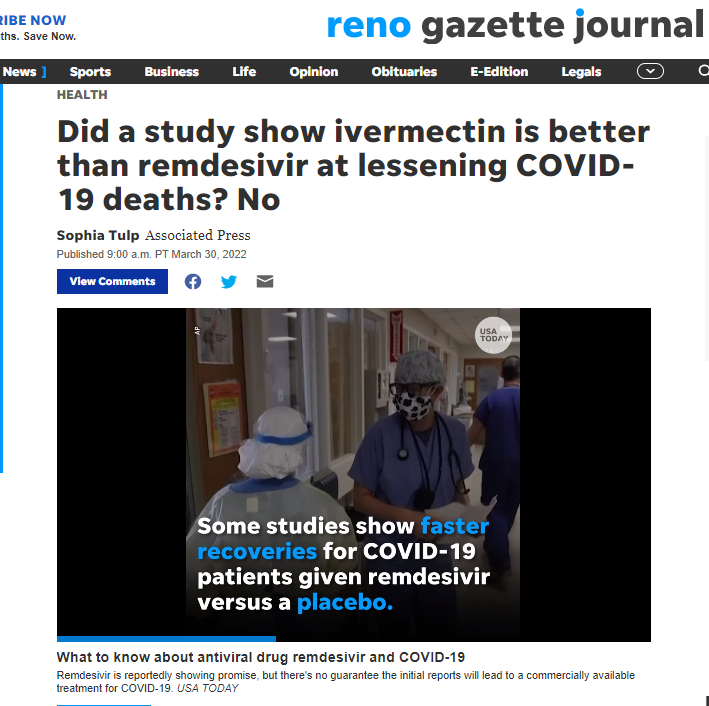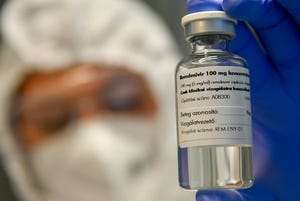A recent story in The Epoch Times – a free newspaper distributed in the Reno area with ties to the Falun Gong spiritual movement – featured the headline “Ivermectin Linked to Fewer Deaths in COVID-19 Patients Compared to Remdesivir: Study.”
RGJ reader Barbara Miner from Reno said that friends had shared the article with her. She requested the RGJ do a fact checker on it.

• Short answer: Sophia Tulp at the Associated Press looked into this claim. Her fact checker can be read below. She found that the study in question was not even a study but an abstract, or 500-word summary, of an unpublished study that was not peer-reviewed. The full study was withdrawn after several major design flaws in it were found. The biggest was that the patients given ivermectin were less sick and not hospitalized while the patients given remdesivir were in the highest bracket for the chance of dying (older and hospitalized) so the comparison in treatment outcomes was not apples-to-apples. Other larger, randomized trials have found no compelling evidence that ivermectin can successfully treat, prevent or improve the outcomes of COVID-19.
~ Mark Robison, Reno Gazette Journal

Full fact checker
By Sophia Tulp, Associated Press
CLAIM: A recently published study shows that ivermectin is more effective than remdesivir in reducing mortality when treating COVID-19.
THE FACTS: Social media users are misinterpreting a research paper abstract, falsely claiming its findings prove that the anti-parasitic drug ivermectin is an effective treatment for COVID-19, and may be more effective than the approved antiviral medicine remdesivir.
Several Twitter accounts that have previously spread COVID-19 misinformation to their large followings shared a link to the abstract, titled: “Treatment with Ivermectin Is Associated with Decreased Mortality in COVID-19 Patients: Analysis of a National Federated Database.”
But claims that suggest the abstract supports using ivermectin for COVID-19 patients fail to acknowledge several key issues.
The article was published by the International Journal of Infectious Diseases this month in a special issue containing abstracts submitted to its November 2021 International Meeting on Emerging Diseases and Surveillance conference.
The approximately 500-word abstracts underwent review and scoring by two independent reviewers, but did not go through a full peer-review, a much more rigorous process.

“High scoring abstracts accepted for presentation at IMED are published as a special supplement to the International Journal of Infectious Diseases without further review by the journal Editor, Associate Editors or journal reviewers,” according to IJID’s website.
Iakov Efimenko, a fourth-year medical student at the University of Miami who plans to be a plastic surgeon, was the lead author of the study, which evaluated the difference in mortality between COVID-19 patients treated with ivermectin and those treated with remdesivir.
The study was retrospective and observational, meaning the researchers looked at existing data from a national database of patient records that were collected for reasons other than the research.
While the study found that ivermectin was associated with decreased mortality, co-author Dr. Jose Gonzales-Zamora, an infectious diseases specialist for the University of Miami Health System, told the AP that association is not the same thing as causality.
Gonzales-Zamora noted that the abstract states that larger, randomized clinical trials would be needed to draw any conclusions.
In fact, such trials have taken place in the months since their analysis was conducted and those trials found no compelling evidence that ivermectin can successfully treat, prevent or improve the outcomes of COVID-19, according to Gonzales-Zamora and two other experts.
Efimenko told the AP that he submitted the abstract to the conference in August 2021, but was unaware it would be published. Following the conference, he submitted a full manuscript that was peer-reviewed, but later withdrew it after evaluating several key flaws with the study design.
“We received a lot of feedback and we realized that there was a lot of confounding variables and that the study overall was very weak,” Efimenko told the AP. “It would really serve no purpose.”
Efimenko said he outlined those issues in the limitation section of the withdrawn manuscript. However, the condensed abstract that was published online was not able to accommodate the information.
Among the variables that could skew the research, also known as confounding variables, was the fact that the patients given ivermectin were not hospitalized and were less sick than the patients given remdesivir, who were older and had to be hospitalized. There were also far more patients given remdesivir to choose from than those who had received ivermectin.
Dr. Nicholas Mark, an ICU doctor at Swedish Medical Center in Seattle, outlined some of the issues with the abstract in a Twitter thread after he saw the findings being misinterpreted online.
“Remdesivir is given to people who are hospitalized with COVID,” Mark told the AP. “You already have selected for the sickest 10% of people who already have a higher mortality rate. You add another element to this, which is the ivermectin. Most credible doctors don’t give ivermectin. Very few hospitals have it even allowed to give. And so when you compare ivermectin versus remdesivir, de facto, what you’re doing, is you’re comparing somebody who is well enough to get treated outside the hospital versus somebody who’s sick enough to require treatment in the hospital.”
Mark explained that the highest quality scientific evidence comes from prospective, blinded, randomized trials. He said that a retrospective, observational study with confounders such as this one, would yield “really low quality evidence.” He pointed out that most people sharing the abstract online likely weren’t aware of the difference.
“So superficially, this looks amazing, right?” Mark said. “It shows a reduction in mortality when one thing was given versus something else, and that can totally confuse people if you’re not well-versed in how we do studies and what makes a good study versus a less good study.”
Ivermectin is not authorized or approved by FDA for use against COVID-19, and most health experts and agencies recommend against prescribing the anti-parasite drug for this purpose.
Both Efimenko and Gonzales-Zamora clarified that they do not recommend it for such use, nor does Gonzales-Zamora prescribe it to patients for COVID-19.
Original Website:https://www.rgj.com/story/news/health/2022/03/30/ivermectin-not-better-study-did-not-show-ivermectin-better-than-remdesivir-covid-deaths-fact-check/7205794001/